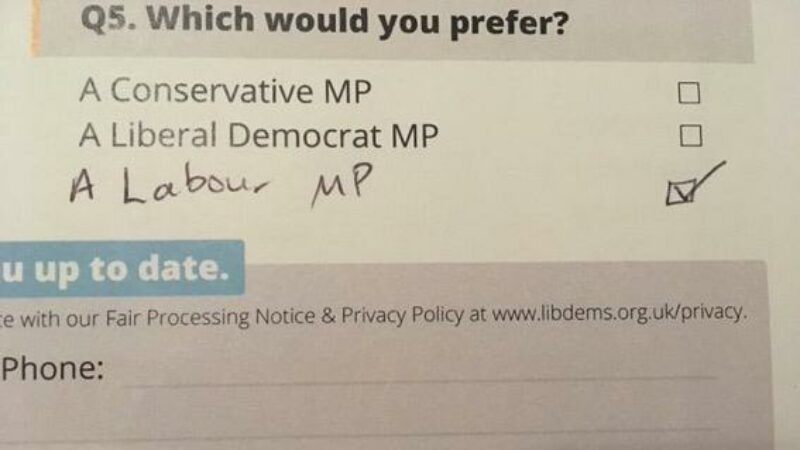
Last Friday morning, with the hazy glow of good local election results in the air, national campaign co-ordinator Shabana Mahmood said Labour was “on course for a majority government”. Yesterday, with the high fading, Keir Starmer repeatedly refused to rule out coalition with the Liberal Democrats, saying he was “not answering hypotheticals”.
What would a Lib-Lab coalition look like (other, of course, than “deeply unlikely on current polling”, but hey, we’ve all decided to play this game)? The Liberal Democrats are the political equivalent of a memory foam mattress, taking on the shape of whoever happens to be there. When this is the Tories, it’s very bad (see, UK government 2010-2015); if it’s Labour, it’s probably basically fine. Liberal Democrat leader Ed Davey has said he views it as his job to “beat the Conservatives”, which doesn’t exactly give the party oodles of leverage in circumstances where their way to stick it to Labour coalition partners would be to vote with Tory MPs.
Like a memory foam mattress, coalition with the Lib Dems does, perhaps, slightly improve one’s posture; a nagging story for Labour this week has been the party’s refusal to say they would scrap the Public Order Act if in government, providing broader fears about how a Labour government might hand civil liberties matters. During the last Labour government, it was oftenthe Liberal Democrats, under Paddy Ashdown and Charles Kennedy, that held Labour’s feet to the fire on the over-extension of government powers. In Wales, Labour has recently governed with the support of the Liberal Democrats to no particular ill-effect. It’s not exactly “coalition of chaos” territory.
So who knows, maybe Starmer and Barbour-jacketed Davey will finally solve the “progressive dilemma” that has haunted Britain for a century. Or maybe the Lib Dems will sink the government by blowing the entire GDP on big comedy props. Or maybe we will stop talking about this soon because Labour is polling 19 points ahead of the Tories and local election results are an imperfect barometer for Westminster prediction.
Starmer did, however, offer a straight answer on whether Labour would do a deal with the SNP: it’s a hard no. With the nationalists, it’s a case of if you can’t join ’em, beat ’em, which Labour seems to believe it can, despite some dour words from polling guru John Curtice about the party’s failure to make gains. Even still, the SNP are not polling fabulously, and, in the words of sad-faced (wouldn’t you be?) new leader Humza Yousaf, the series of arrests and spiralling internal finances scandal that have recently consumed the party are “not great” for them (Yousaf has also said he is always “surprised” to see one of his colleagues arrested; a sentiment one imagines was shared in the Republic offices this weekend).
A very imperfect dry-run for a Labour vs SNP election is looming in Rutherglen and Hamilton West, where Labour has just selected its candidate (Ged Killen, the Labour MP between 2017 and 2019, was initially re-selected but stepped away). Michael Shanks, a local teacher, has been picked to fight the seat currently held by Margaret Ferrier, the former SNP MP who has been sitting as an independent since her infamous Covid regulations breach in 2020 and is now likely to be subject to a by-election via recall petition. Ferrier was elected with a 5,320 majority in 2019 – but given her conduct, it’s not exactly a petri-dish for more conventional contests between Labour and the nationalists.
A couple of other seats are also now open for selection, most notably former Labour deputy leader Tom Watson’s old seat of West Bromwich East. A former Watson staffer, Sarah Coombes, has thrown her hat into the ring, as has Gerard Coyne, who has twice run as the candidate of the right for general secretary of Unite, losing to Len McCluskey in 2017 and Sharon Graham in 2022. Following Watson’s retirement, the seat was contested for Labour by controversial kebab mogul Ibrahim Dogus in 2019 and won by the Conservative Nicola Richards by a slim majority. Richards – just 28 – has announced she will not run again, and the seat is a plum one for any aspiring Labour candidates. Similarly appealing to any Labour hopefuls is Copeland, also open for applications, a generally safe Labour seat until it went blue at a 2017 by-election.
Sign up to LabourList’s morning email for everything Labour, every weekday morning.



More from LabourList
Almost half of Labour members oppose plans to restrict jury trials, poll finds
‘How Labour can finally fix Britain’s 5G problem’
‘The University of the Air – celebrating 60 years of Harold Wilson and Jennie Lee’s vision’